
News Releases
White House Advisors’ Push for Corporate ‘Minimum Tax’ Will Not Fix the Tax Law
February 19, 2020 • By Matthew Gardner
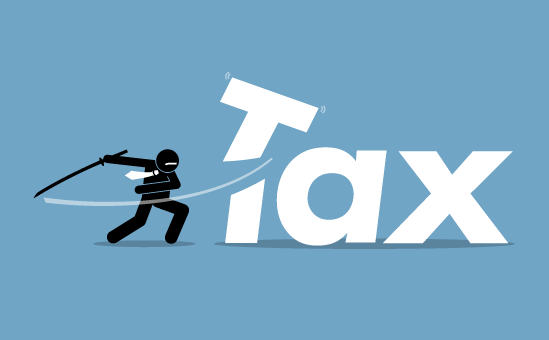
A White House proposal to follow Trump’s massive corporate tax cuts with a minimum corporate tax would be like shooting a person on Fifth Avenue and then offering them a band aid.
“Budget for America’s Future” Cuts Funding for Essentials
February 10, 2020 • By Amy Hanauer

The budget proposal reinforces the Trump Administration’s commitment to maintaining trillions in tax cuts for the rich and corporations, even if it requires cutting support for food assistance, cutting funding support for education, harming our environment or taking away health care from millions of Americans.
Fortune 500 Companies Avoided $73.9 Billion in Tax Under First Year of Trump Tax Law
December 16, 2019 • By Matthew Gardner
A comprehensive examination of Fortune 500 companies’ financial filings in 2018, the first year of the Tax Cuts and Jobs Act, finds that the law did nothing to curb corporate tax avoidance, with 91 companies paying $0 in taxes on U.S. income in 2018 and profitable companies overall paying a collective effective tax rate of 11.3 percent, which is barely more than half the 21 percent rate established by the tax law, the Institute on Taxation and Economic Policy (ITEP) said today.
Amy Hanauer Appointed as Executive Director of ITEP-CTJ
November 5, 2019 • By ITEP Staff
Institute on Taxation and Economic Policy (ITEP) and Citizens for Tax Justice (CTJ) Boards of Directors announced today the appointment of Amy Hanauer as Executive Director to lead the organizations’ tax justice work. Hanauer, founder of Policy Matters Ohio, will assume responsibilities mid-January 2020, joined by long-time ITEP-CTJ team member Meg Wiehe in her expanded role as Deputy Executive Director. Together the pair will lead the organizations in transforming tax policies to better meet the country’s needs.
Senator Releases Plan That Would Increase Capital Gains Tax Rates, Close Loopholes
September 12, 2019 • By Alan Essig
Following is a statement from Alan Essig, executive director for the Institute on Taxation and Economic Policy, on the paper released today by the Senate Finance Committee’s ranking Democrat, Ron Wyden, calling for anti-deferral accounting, which could dramatically reform the way the U.S. taxes capital gains.
New Report: A Chicago EITC Would Benefit up to 1 Million Chicago Families
September 12, 2019 • By Lisa Christensen Gee
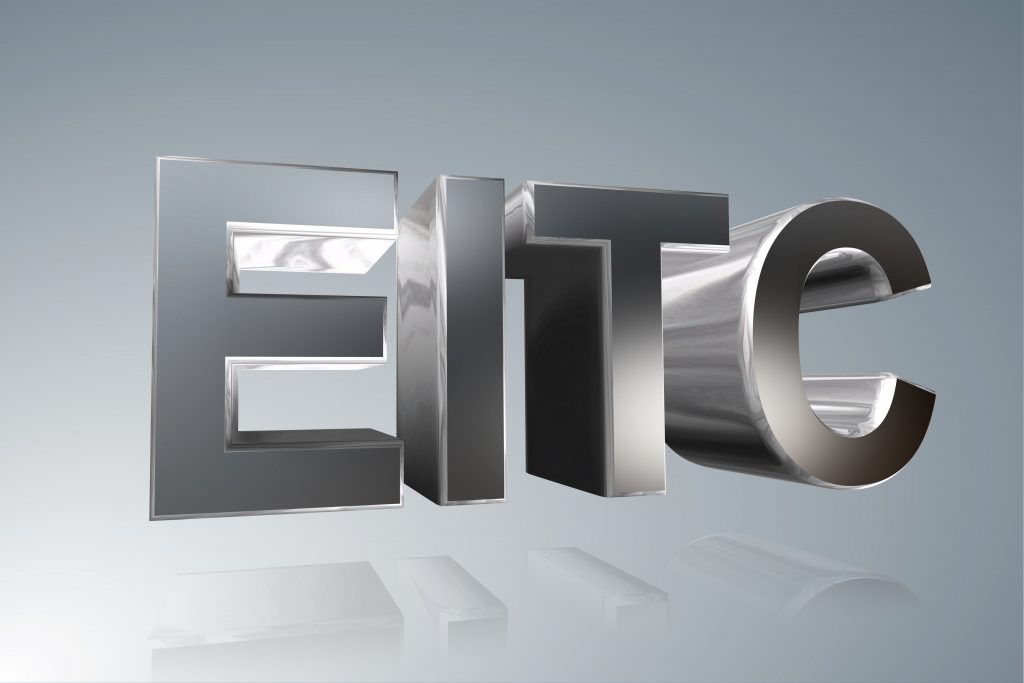
Media contact Report outlines policy options for Chicago Resilient Families Initiative Task Force Recommendations A new report reveals that a city-level, Chicago Earned Income Tax Credit would boost the economic security of 546,000 to 1 million of the city’s working families, the Institute on Taxation and Economic Policy (ITEP) and Economic Security for Illinois said today. […]
Notes from Alan Essig, Executive Director of the Institute on Taxation and Economic Policy and Citizens for Tax Justice, and Joan Entmacher, Board Chair of the Institute on Taxation and Economic Policy, and Ed Jayne, Board Chair of Citizens for Tax Justice, announcing leadership transition.
Sales Tax Holidays Are Outdated Gimmicks That Have Run Their Course
July 17, 2019 • By ITEP Staff

Just as the very first sales tax holiday for car sales did not fix the auto industry’s challenges, providing consumers a temporary reprieve on sales tax will not address families’ pocketbook concerns.
Travelers in 12 States Will Pay More in Gas Taxes Beginning Monday
June 27, 2019 • By Carl Davis

Drivers in 12 states who hit the road during this summer driving season will be paying more in gas tax beginning Monday, July 1. While the federal gas tax has remained stagnant for nearly 26 years, many states have stepped up and increased their taxes so they can raise revenue to fund infrastructure and other projects. California, Indiana, Maryland, Michigan, Montana, Nebraska, Ohio, Rhode Island, South Carolina, Tennessee and Vermont all will raise their gas taxes.

Following is a statement by Carl Davis, research director at the Institute on Taxation and Economic Policy, regarding Department of Treasury regulations released today to address state policies that allow taxpayers to receive overly generous tax credits for charitable deductions. “This regulation rightly addresses a long-standing tax loophole that gave high-income taxpayers one more way […]
Five Recent Federal Tax Credit Proposals Target Benefits to Bottom 60 Percent of Taxpayers
May 22, 2019 • By ITEP Staff
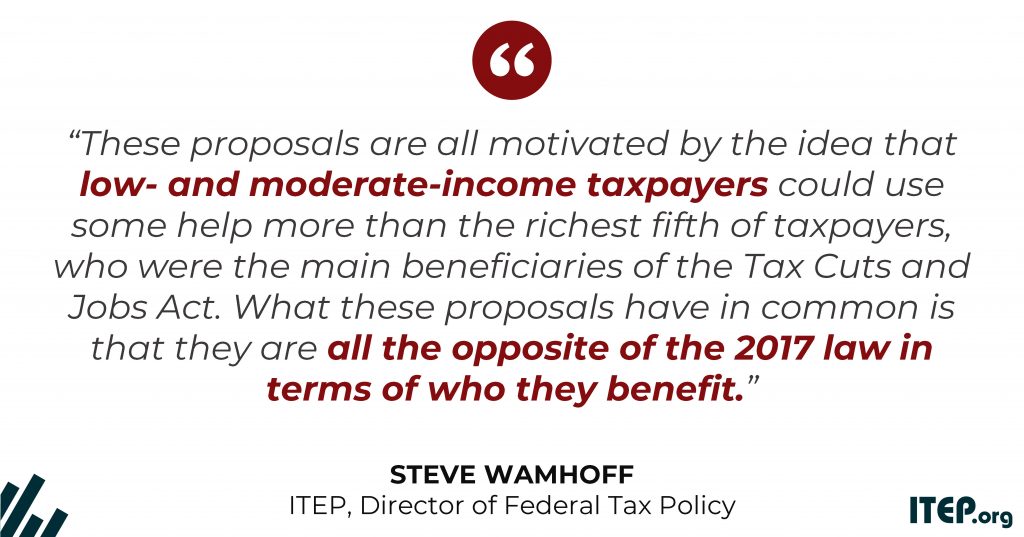
Five tax proposals announced this year are a radical departure from the top-heavy 2017 Tax Cuts and Jobs Act, targeting their benefits instead to low- and moderate income families while providing no or nominal tax cuts to the highest-earning households, a new Institute on Taxation and Economic Policy analysis of each of the five plans reveals.
New 50-State Analysis: State Child Tax Credits Would Lift 2.1 to 4.5 Million Children out of Poverty
April 17, 2019 • By ITEP Staff
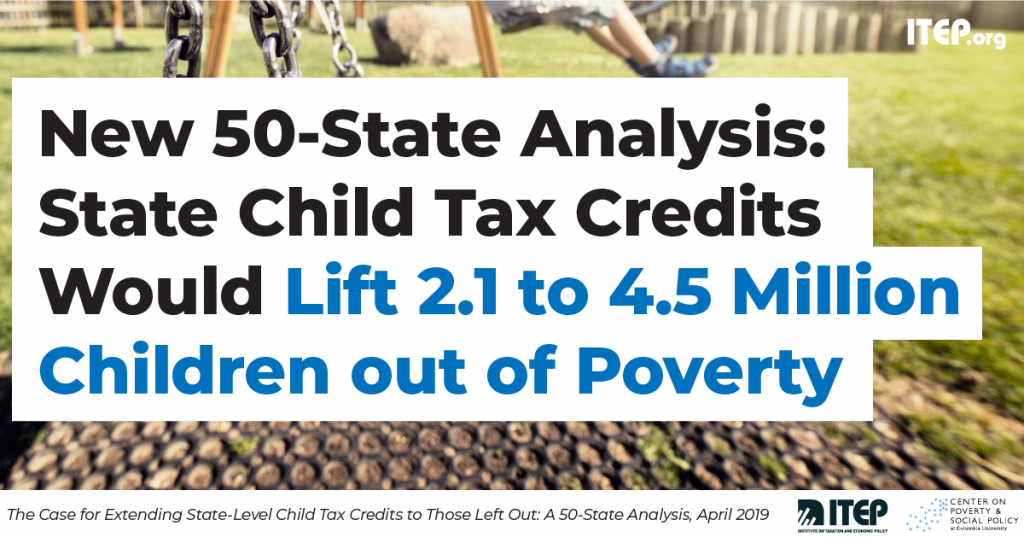
Expanding the Child Tax Credit (CTC) at the state level could lift millions of children out of poverty and help families who benefited little or not at all from the 2017 federal expansion of the CTC, according to a 50-state report released today by the Institute on Taxation and Economic Policy and the Center on Poverty and Social Policy at Columbia University.
60 Fortune 500 Companies Avoided All Federal Income Tax in 2018 Under New Tax Law
April 11, 2019 • By Matthew Gardner
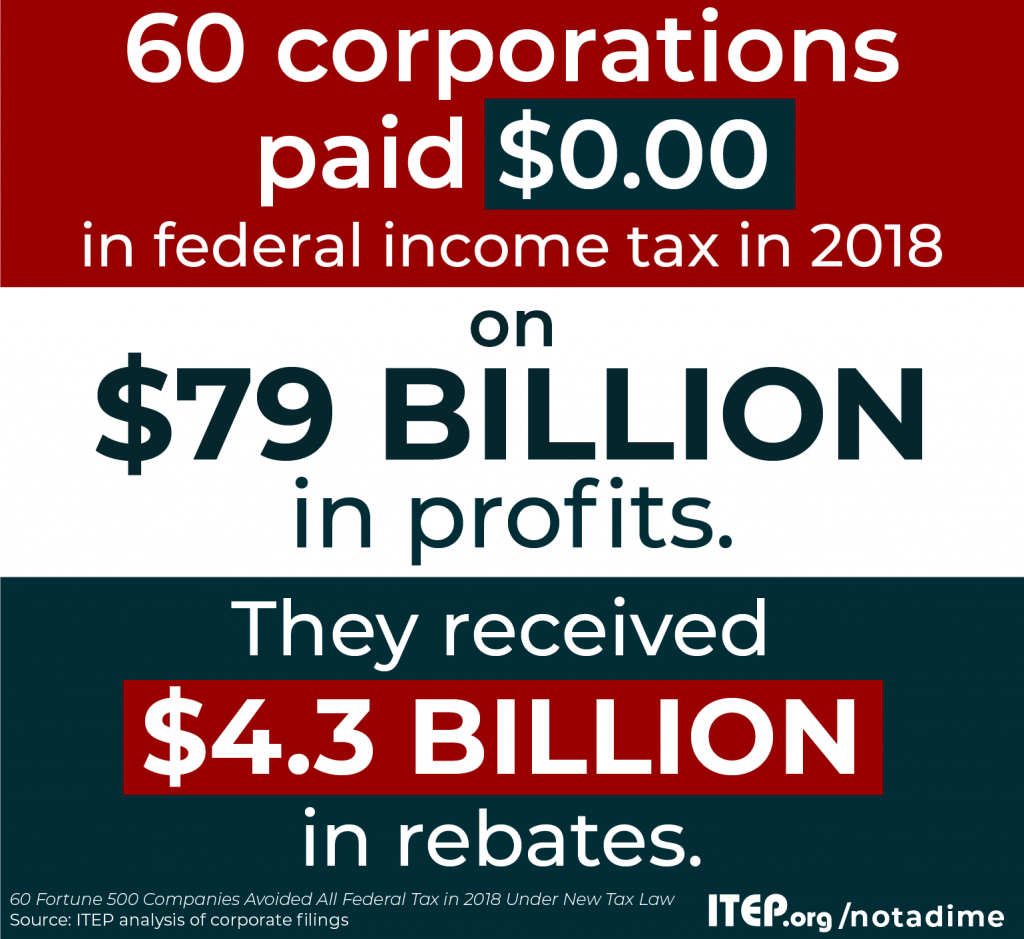
91 corporations did not pay federal income taxes on their 2018 U.S. income. Read the follow-up report released in December 2019, Corporate Tax Avoidance in the First Year of the Trump Tax Law. Media Contact An in-depth analysis of Fortune 500 companies’ financial filings finds that at least 60 of the nation’s biggest corporations didn’t […]
White House Budget Fails to Acknowledge Role of Tax Cuts in the Deficit while Calling for Draconian Spending Cuts
March 11, 2019 • By Alan Essig

As expected, the president’s budget would enshrine top-heavy tax cuts into law and finance them by slashing domestic programs. It is time for a course correction.
Gov. Pritzker’s Tax Proposal Is a Huge Step Toward Fairer Taxes
March 7, 2019 • By Lisa Christensen Gee
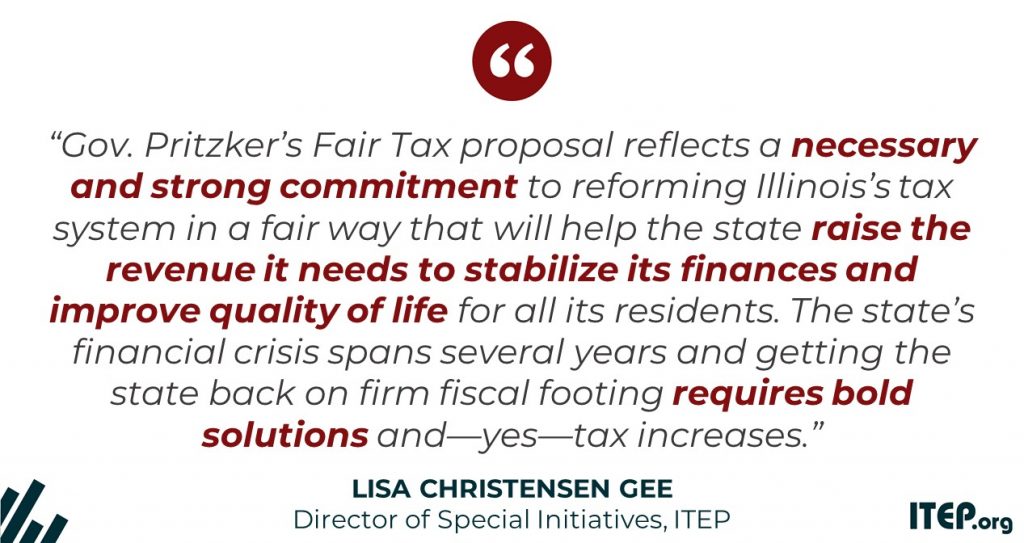
Gov. Pritzker’s Fair Tax proposal reflects a necessary and strong commitment to reforming Illinois’s tax system in a fair way that will help the state raise the revenue it needs to stabilize its finances and improve quality of life for all its residents. The state’s financial crisis spans several years and getting the state back on firm fiscal footing requires bold solutions and—yes—tax increases.
Education Department Tax Credit Proposal Would Undermine Public Schools
February 28, 2019 • By Carl Davis
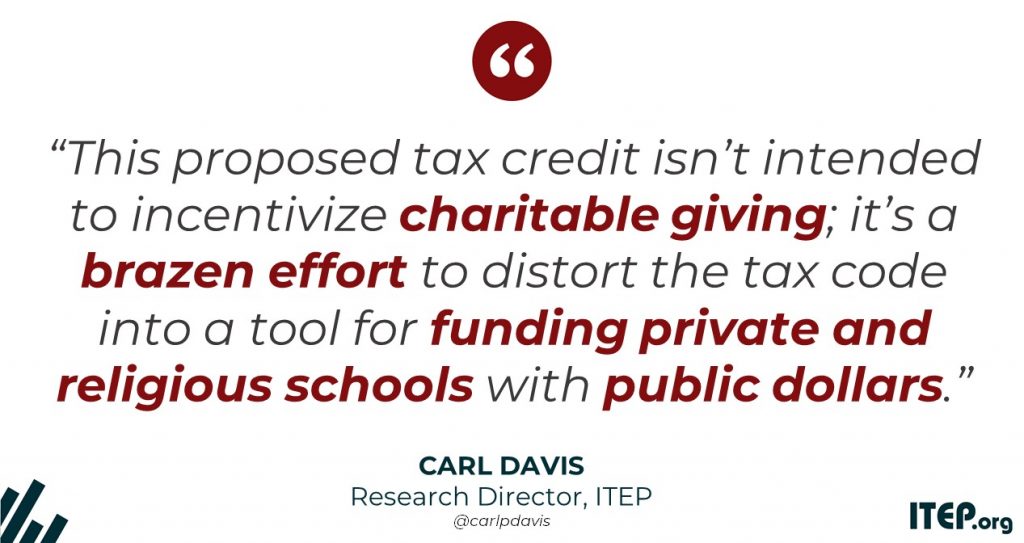
The Education Department today announced a proposed new federal tax credit for so-called school choice. The $5 billion proposal would give those who donate to private school voucher programs a tax credit. Following is a statement by Carl Davis, research director at the Institute on Taxation and Economic Policy.
New Report Outlines Seven Progressive Revenue-Raising Options
February 5, 2019 • By ITEP Staff
ITEP today released a report that charts a path for Congress to enact progressive, revenue-raising tax policies that would target high-income households and reverse the damage from TCJA and prior rounds of tax cuts that disproportionately benefited the well-off.
New Report Makes the Case for a Wealth Tax; Analysis Finds Such a Tax Could Raise More Than $1 Trillion Over a Decade
January 23, 2019 • By ITEP Staff

A federal wealth tax on the top 0.1 percent of households could raise significant tax revenue, curb growing economic inequality and help make the tax system fairer, a new report released today by the Institute on Taxation and Economic Policy (ITEP) finds.
Five Years in, Cannabis Tax Haul Rivals or Exceeds Alcohol Taxes in Many States
January 23, 2019 • By ITEP Staff
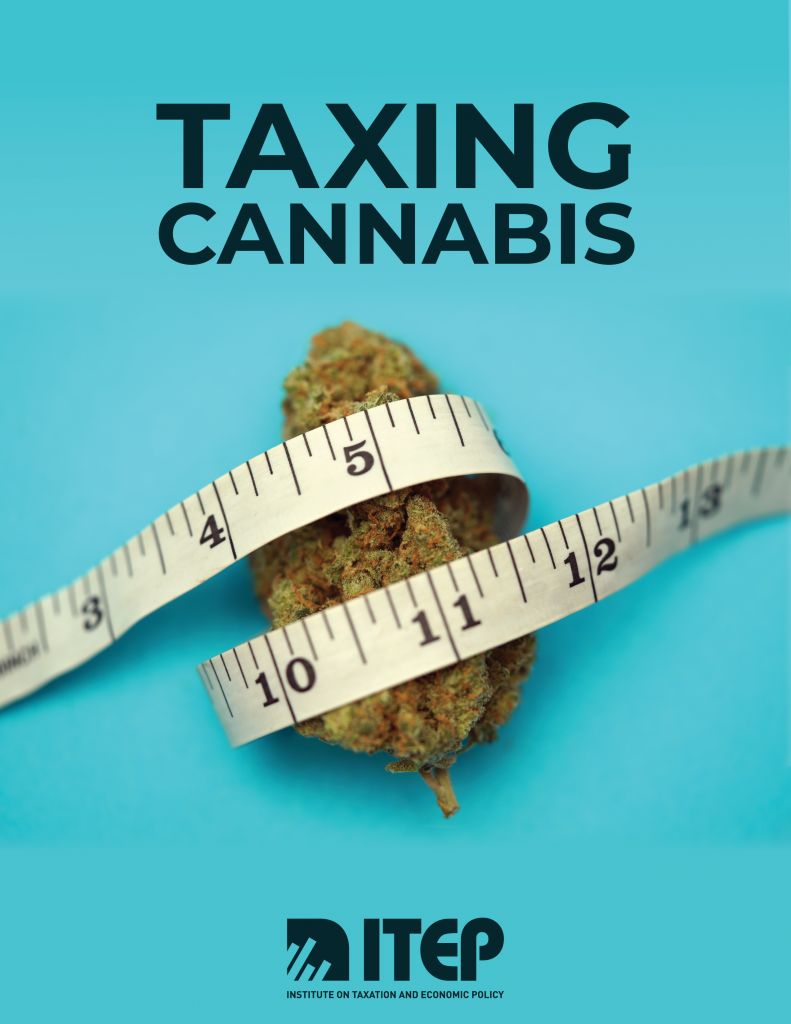
A first-of-its-kind look at state excise taxes on legal cannabis sales finds that taxing the substance can be a meaningful source of state revenue but cautions that achieving sustainable revenues over time will be difficult under the price-based tax structures adopted in most states thus far.
Gov. Cuomo Has the Right Idea on How to Tax Recreational Cannabis
January 15, 2019 • By ITEP Staff
Following is a statement by Carl Davis, research director at the Institute on Taxation and Economic Policy, regarding the cannabis tax structure unveiled by New York Gov. Andrew Cuomo.
2017 Tax Law Leaves More Wealthy Heirs with Tax-Free Inheritances
December 6, 2018 • By ITEP Staff
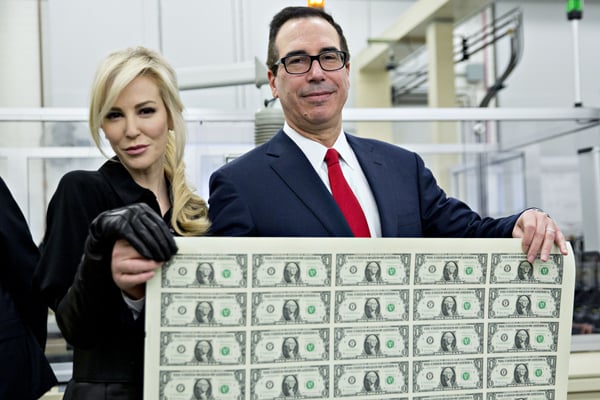
Media contact A tiny fraction of estates will be subject to the tax in 2018 The Tax Cuts and Jobs Act drastically reduced the number of estates that are subject to the estate tax, which is an incredible feat given only a fraction of 1 percent of estates owed any tax in recent years, the […]
New 50-State Analysis: SALT Cap Repeal Would Be Costly, Mostly Benefit Top 1%
November 14, 2018 • By ITEP Staff
Repealing the 2017 tax law’s cap on state and local tax (SALT) deductions without replacing it with a different type of limit would pile one bad policy on top of the other, annually add $88 billion to the deficit-financed tax law, and mostly benefit the wealthy, a new 50-state analysis released today by the Institute on Taxation and Economic Policy reveals.
Poorest 20 Percent Pays a 50 Percent Higher Effective State and Local Tax Rate than the Top 1 Percent
October 17, 2018 • By ITEP Staff
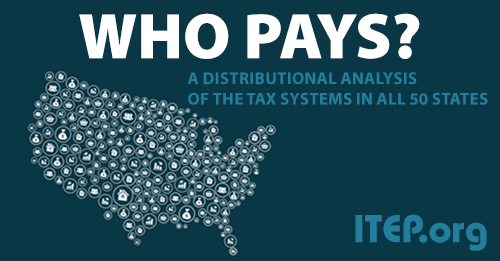
A comprehensive 50-state study released today by the Institute on Taxation and Economic Policy (ITEP) finds that most state and local tax systems tax low- and middle-income households at significantly higher rates than wealthy taxpayers, with the lowest-income households paying an average of 50 percent more of their income in taxes than the very rich.
NYT Expose on Trump Family Tax Avoidance Demonstrates There’s a Different Set of Rules for the Rich and Powerful
October 2, 2018 • By Alan Essig
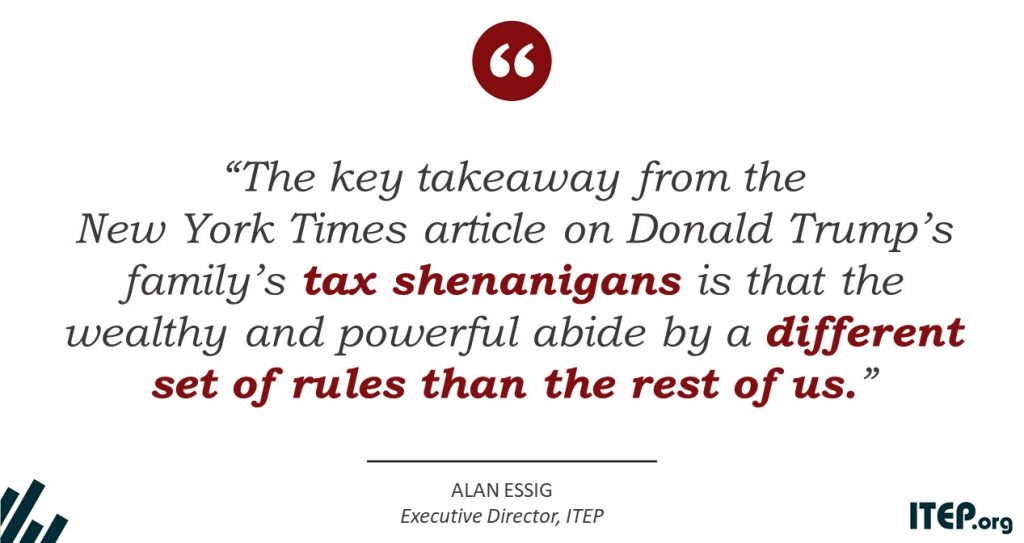
Following is a statement by Alan Essig, executive director of the Institute on Taxation and Economic Policy, regarding an expose in today’s New York Times that reveals Donald Trump’s family engaged in complex schemes to avoid taxes.
U.S. House Advances More Unpopular Tax Cuts That Primarily Benefit the Wealthy
September 28, 2018 • By Alan Essig
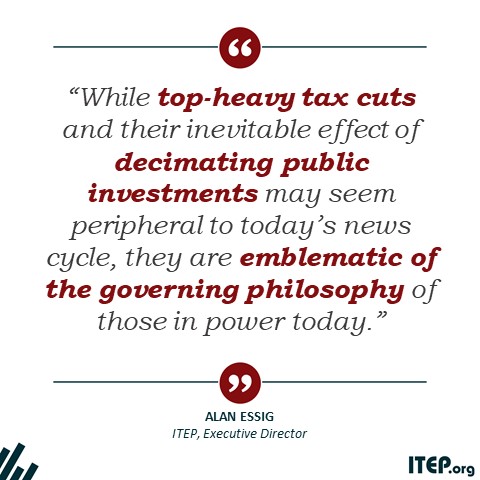
The U.S. House this week voted on so-called Tax Cuts 2.0, a package of three tax bills that, among other things, would make permanent temporary provisions in the Tax Cuts and Jobs Act. Alan Essig, ITEP’s executive director, said the following: “While top-heavy tax cuts and their inevitable effect of decimating public investments may seem peripheral to today’s news cycle, they are emblematic of the governing philosophy of those in power today.”
